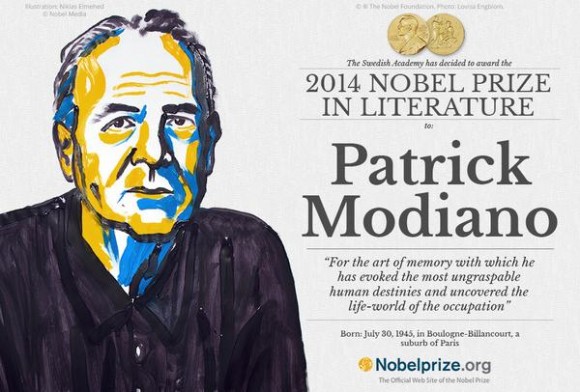
…”all those wasted years during which one did not pay enough attention to trees, to flowers”…) says the main character in Modiano’s latest novel ‘Pour que tu ne te perdes pas dans le quartier’ (which translates roughly as, “To avoid getting yourself lost in the neighborhood”)
France had the distinctive honor of receiving two Nobel prizes in 2014: Jean Tirole was the recipient of the Prize for Economics for his work on the financial crisis and the banking system while Patrick Modiano received the Prize for Literature. He will join an illustrious pantheon of writers from Gunter Grass (Germany) ), Toni Morrison and Nadine Gordimer (South Africa), Wole Soyinka (Nigeria), Gabriel Garcia Marques (Columbia) and Alexander Solzhenitsyn (Soviet Union) to Albert Camus (France) or Ernest Hemingway (USA). Modiano is the 16th laureate from France, giving that country the largest number since beginning of the Nobel awards in 1900.
The press release issued by the Swedish Academy of Sciences selected the French writer, “For the art of memory with which he has evoked the most ungraspable human destinies and uncovered the life-world of the Occupation.” The prize was a recognition of his abundant literary production (30 novels) centered on the protagonists’ search of their own past, in the urban setting of Paris, going back to World War II.
He writes like a sleep walker, plodding through a mysterious, sometimes disjointed sequence of events looking for his lost childhood when he was tossed around from one home to another. Since his first novel, ‘La Place de l’Etoile,’ published in 1968, he has created a world where autobiographic notes are interwoven with the “bad dream” of the Occupation.
Modiano is a tall (6′ 6” ) man of 69 with a kind face and fluttering hands as he speaks. During a 45-minute acceptance speech in Stockholm, his modest personality must have made him endearing to the distinguished audience, particularly when he dedicated his award to his Swedish grandson.
A writer, he said, is usually a poor speaker, who leaves his sentences unfinished, because he is used to editing his text over and over again.
He explained that he belonged to a generation when children were not allowed to speak up and, if they were given a chance to speak, they expected to be interrupted at any time.
During an interview he gave in his study, surrounded by thousands of books, he asked, “Why would I write another book when so many have been already written?” Then he added, “It is probably at the sight of his own bookcases that a discouraged Scott Fitzgerald took up drinking.”
He claims, with incredible modesty, that “It is with bad poets that one obtains prose writers.”
According to Alice Kaplan, head of the French department at Yale University, Modiano can be labelled as the Marcel Proust of modern times.
Claire Duvarrieux, head of the ‘Books’ department of the daily newspaper, Liberation, describes the works of Modiano as a collective memory of France during the war, the German Occupation, collaboration, the persecution of the Jews and finally, the war in Algeria.
With Louis Malle, he co-wrote the scenario of Lacombe Lucien in 1974, one of the best French “New Wave” films.

About the author: Nicole Prévost Logan divides her time between Essex and Paris, spending summers in the former and winters in the latter. She writes a regular column for us from her Paris home where her topics will include politics, economy, social unrest — mostly in France — but also in other European countries. She also covers a variety of art exhibits and the performing arts in Europe. Logan is the author of ‘Forever on the Road: A Franco-American Family’s Thirty Years in the Foreign Service,’ an autobiography of her life as the wife of an overseas diplomat, who lived in 10 foreign countries on three continents. Her experiences during her foreign service life included being in Lebanon when civil war erupted, excavating a medieval city in Moscow and spending a week under house arrest in Guinea.
Nicole: Isn’t that what Baudelaire’s “le flaneur” actually wanted, to “become lost in the neighborhood?”